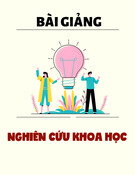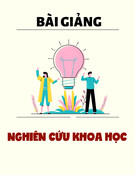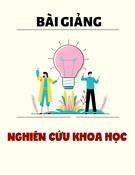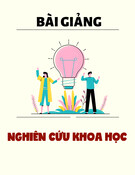
TNU Journal of Science and Technology 230(04): 460 - 467
http://jst.tnu.edu.vn 460 Email: jst@tnu.edu.vn
ANALYSIS OF AN EFL TEACHER EDUCATION CURRICULUM IN
VIETNAM FROM THE PERSPECTIVE OF SOCIAL-EMOTIONAL
COMPETENCES
Tran Thi Yen
*
TNU - University of Education
ARTICLE INFO ABSTRACT
Received:
27/03/2025
This study aims to investigate the integration of social-
emotional
competences in the pre-
service EFL teacher education curriculum of a
pedagogical university in Vietnam. Document analysis was utilized and data
analysis results show that although social-
emotional competences are
significant
ly represented in the curriculum, they are largely implicit and
unevenly distributed across the five core social-
emotional competences as
well as their specific skills. Specifically, Self-
Management and Relationship
Skills are strongly emphasized while Self-
Awareness, Responsible
Decision-
Making and Social Awareness are much less emphasized in the
curriculum. Notably, Self-
Awareness is the least emphasized competence
among the five core competences. This uneven distribution is
understandable as it reflects
Vietnamese cultural and educational values,
which tend to prioritize collective harmony over individual emotional
expression. The findings of the study can offer valuable guidance for
educational policymakers, curriculum developers and educators in
promoti
ng holistic teacher education and EFL instruction. Based on these
findings, practical recommendations are provided, including explicit
integration of social-
emotional competences in the teacher training
curriculum, especially in learning outcomes, course c
ontents, separate
modules, daily practices and assessment criteria.
Revised:
29/04/2025
Published:
30/04/2025
KEYWORDS
Social emotional learning
Social-emotional competencies
EFL teacher education
Holistic education
Curriculum analysis
PHÂN TÍCH MỘT CHƯƠNG TRÌNH ĐÀO TẠO GIÁO VIÊN TIẾNG ANH
TẠI VIỆT NAM DƯỚI GÓC ĐỘ NĂNG LỰC CẢM XÚC – XÃ HỘI
Trần Thị Yến
Trường Đại học Sư phạm - ĐH Thái Nguyên
THÔNG TIN BÀI BÁO TÓM TẮT
Ngày nhậ
n bài:
27/03/2025
Mục đích của nghiên cứu này là khám phá mức độ lồng ghép các năng lực cả
m
xúc – xã hội trong chương trình đào tạo giáo viên tiếng Anh tại một trường đạ
i
học sư phạm ở Việt Nam. Thông qua phân tích chương trình đào tạo, kết quả
phân tích số liệu cho thấy các năng lực cảm xúc – xã hội tuy đã được lồng gh
ép
trong chương trình, nhưng chủ yếu ở dạng gián tiếp và phân bố chưa đồng đề
u
giữa năm nhóm năng lực cốt lõi cũng như các kỹ năng thành phần. Cụ thể
,
năng lực tự quản lý bản thân và xây dựng mối quan hệ là hai nhóm được thể
hiện rõ nét nhất trong khi năng lực tự nhận thức về bản thân, ra quyết đị
nh có
trách nhiệm và nhận thức xã hội xuất hiện với tần suất ít hơn. Đáng chú ý, tự
nhận thức về bản thân là nhóm năng lực ít được đề cập nhất. Sự phân bố
không
đồng đều những năng lực này không khó hiểu vì nó phản ánh các giá trị
văn
hóa giáo dục Việt Nam vốn đề cao sự hài hòa tập thể hơn là biểu đạt cả
m xúc
cá nhân. Những phát hiện này sẽ giúp các nhà hoạch định chính sách, ngườ
i
xây dựng chương trình và giảng viên trong việc định hướng phát triể
n chương
trình đào tạo giáo viên một cách toàn diện hơn. Trên cơ sở đó, nghiên cứu đề
xuất một số khuyến nghị cụ thể như: lồng ghép các năng lực cảm xúc – xã hộ
i
vào chương trình đào tạo giáo viên một cách rõ ràng hơn, đặc biệt vào chuẩ
n
đầu ra, nội dung học phần, mô-đun chuyên biệt, thực hành thườ
ng xuyên và
tiêu chí đánh giá.
Ngày hoàn thiệ
n:
29/04/2025
Ngày đăng:
30/04/2025
TỪ KHÓA
Học tập cảm xúc – xã hội
Năng lực cảm xúc – xã hội
Đào tạo giáo viên tiếng Anh
Giáo dục toàn diện
Phân tích chương trình
DOI: https://doi.org/10.34238/tnu-jst.12403
* Email: yentran@dhsptn.edu.vn

TNU Journal of Science and Technology 230(04): 460 - 467
http://jst.tnu.edu.vn 461 Email: jst@tnu.edu.vn
1. Introduction
1.1. Rationale
Social Emotional Learning (SEL) has been increasingly recognized as an integral part of
education in many parts of the world. SEL is valued by scholars worldwide for its positive impacts
on students' academic outcomes, emotional well-being and social skills [1]. In teacher education,
SEL has also gained increasing attention as researchers believe that SEL integration can foster
social-emotional competences (SECs) for future teachers, which not only help them manage their
classrooms effectively but also prepare them to model and teach these skills in their students [2] -
[4]. With growing international recognition, teacher training programs worldwide are increasingly
adopting explicit SEL frameworks such as those provided by the Collaborative for Academic,
Social and Emotional Learning (CASEL) to train future teachers with the hope that they will
become not only academically proficient but also socially and emotionally competent.
In the field of EFL teaching and learning, SEL plays a very meaningful role. Research has
demonstrated that language learning processes inherently involve emotional and social factors such
as anxiety, shyness, lack of confidence, pressure and cross-cultural communication rules [5] - [8].
Therefore, EFL teacher education programs need to equip future teachers with essential SECs not
only for their own sake but also for the benefits of their students. With strong SECs, teachers are
more likely to model and foster SECs for their students [4], [9], [10]. These practices will contribute
to promoting students’ holistic development by enhancing their language proficiency and fostering
their social and emotional skills at the same time.
When it comes to Vietnam, although its educational philosophy and practices are historically
influenced by Confucian values, the country still recognizes the importance of holistic
education.Therefore, it has introduced significant reforms. One of the most comprehensive reforms can
be seen through the 2018 National General Education Curriculum, which has made a strong transition
towards competency-based and holistic education [11]. This reform strongly emphasizes the
importance of general and specific competences, values, attitudes and behaviors, not just knowledge
acquisition. Basically, most of these qualities, values and skills align with SEL principles. Despite these
favorable conditions, explicit SEL implementation in Vietnam remains limited [8], [12]. Similarly,
systematic research on the integration of SEL in general and SECs in particular in EFL teacher
education programs in Vietnam remains limited [9], [10], [12], [13]. This research gap highlights
ongoing uncertainties about the extent to which SEL is currently integrated into the EFL teacher
education curriculum and how well pre-service EFL teachers are equipped with essential SECs.
A thorough and detailed curriculum analysis, therefore, was conducted to fill this gap. This
analysis focuses on analyzing the EFL teacher education curriculum of a pedagogical university in
Vietnam to assess the extent to which the five core SECs and their specific skills are addressed.
This analysis was guided by the CASEL framework, a globally well-established framework for
systemic SEL as it offers a comprehensive framework with specific, actionable and measurable
skills [1]. The findings of the study revealed the current status of SEL integration, identifying
strengths and limitations of the curriculum in terms of SEL. These findings provided a firm
foundation for the researcher to make practical recommendations for enhancing SEL
implementation in Vietnamese teacher training programs.
1.2. Social Emotional Learning and the CASEL Framework
According to CASEL [1], SEL is “the process through which all young people and adults acquire
and apply the knowledge, skills and attitudes to develop healthy identities, manage emotions and
achieve personal and collective goals, feel and show empathy for others, establish and maintain
supportive relationships and make responsible and caring decisions.” CASEL has also developed a
Framework for Systemic SEL, which outlines five core SECs along with their specific skills, which
have been proven to be essential for success in school, life and professional contexts [14].

TNU Journal of Science and Technology 230(04): 460 - 467
http://jst.tnu.edu.vn 462 Email: jst@tnu.edu.vn
Figure 1 provides an overview of this framework, which lays the theoretical foundation for this
study. At the center of the framework are the five core SECs, namely Self-Awareness, Self-
Management, Social Awareness, Relationship Skills and Responsible Decision-Making.
Surrounding the core competencies are different layers of influence, including classrooms, schools,
families and caregivers and communities. These layers indicate the support needed for effective
SEL implementation, including SEL instruction and classroom climate, schoolwide culture,
practices, policies, authentic partnerships and aligned learning opportunities.
The framework is built and continuously developed based on extensive research and best
practices. Therefore, it has broad applicability and empirical validation. It provides educators with
clear and comprehensive guidelines to support students’ emotional intelligence and social
competence, contributing to holistic development [2], [4], [14]. That is why the CASEL framework
was selected as the analytical framework for the present document analysis. It offers a structured
basis for examining how the five core SECs are embedded - either explicitly or implicitly;
emphasized or neglected - within the curriculum of EFL teacher education. More specifically, this
study employed the CASEL’s competencies and their associated skill sets as a coding guide to
systematically investigate the curriculum content.
Figure 1. CASEL’s 2020 Framework for Systemic SEL
1.3. Social Emotional Learning in Teacher Education
In recent years, many researchers and educators have acknowledged that preparing future
teachers is not just about equipping them with content knowledge or teaching methods. They
emphasized that it is also necessary to foster their own SECs so that they can better manage stress,
regulate emotions and build stronger relationships with students. Strong SECs also enable teachers
to effectively model, support and teach social and emotional skills for their students [3]. These
competences and their specific skills are essential not only for teachers themselves but also for
their students and other stakeholders. SEL can help build safe, inclusive and supportive learning
environments, which are beneficial for both teachers and students [2] - [4], [10].
Both Pentón Herrera & Martínez-Alba [7] and Tran [10] emphasized that when SEL is explicitly
taught, teacher candidates are more socially and emotionally competent. Lawlor [3] also showed
that SEL should be integrated into every aspect of teacher education, from theory to practical
applications. Similarly, Schonert-Reichl [4] documented that explicit SEL training can foster more
socially and emotionally competent educators, highlighting the growing demand for training in
SEL for both pre-service and early career teachers. Moreover, it was found that many teacher
education programs still lack a structured SEL integration. In other words, SEL is often

TNU Journal of Science and Technology 230(04): 460 - 467
http://jst.tnu.edu.vn 463 Email: jst@tnu.edu.vn
insufficiently addressed, implicitly embedded, unevenly distributed and undervalued in teacher
training curricula. These concerns call for the need to embed SEL as a core component of teacher
education, not just as an optional or extra-curricular program [4].
In the context of teacher education in Vietnam, Huynh et al. [12] reported that many Vietnamese
student teachers were unfamiliar with the term SEL and its related concepts. These pre-service teachers
also showed uncertainty about how to teach SECs for their students, and expressed a clear need for
more concrete training and practical strategies. Phan [13] also noted that although some elements of
SEL were present in teacher training programs, they were typically embedded implicitly within general
psychological or pedagogical courses rather than explicitly taught. Do and Zsolnai [9] also reported a
lack of structured SEL training, which posed challenges for pre-service teachers to deal with the social
and emotional aspects of teaching and learning satisfactorily. These findings point to a significant gap
in how SEL competences and skills are addressed or covered in teacher education programs. This study,
therefore, was conducted to address the gap. It aims to assess how each of the five core SECs and their
specific skills are represented, integrated or perhaps overlooked in the EFL teacher education
curriculum of a pedagogical university in Vietnam.
2. Methodology
This study utilized an in-depth document analysis to explore how SECs are integrated into the
current EFL teacher education curriculum at a pedagogical university in Vietnam. This university
was selected via “purposeful sampling” strategy because it offers a well-established undergraduate
EFL teacher education program. In addition, the university is a familiar site to the researcher;
therefore, it allows for easier access to data sources. The curriculum selected for document analysis
was officially issued in 2022 by the rector of the university, and it was the official and most updated
curriculum at the time of the study. The documents for analysis included both the overall
curriculum framework and a collection of 78 detailed course syllabi. The analysis focused on five
important components of the curriculum, including program learning outcomes, course outcomes,
course contents, teaching methods and assessments [15].
The analysis adopted a deductive coding approach, and was guided by the five core SECs and
their specific skills outlined in the CASEL framework [1] as can be seen in Figure 1. Both explicit
and implicit SEL-related skills were considered and coded. For instance, a course learning outcome
that mentions “understand cultural values of other countries” would be coded as an explicit
reference to Social Awareness, whereas a course content such as “write essays expressing
viewpoints” would be classified as an implicit reference to Self-Awareness. Data analysis was
conducted on MAXQDA software. Text segments within the curriculum documents were
highlighted and coded according to the predefined SEL skills in the coding guide. After the coding
phase had been completed, MAXQDA's visualization tools were used to generate the overall
pattern of the frequency of SECs within the coded data. Excerpts or direct quotations from the
curriculum were then extracted from the software to illustrate the findings presented in the report.
These techniques help ensure the credibility of the findings.
3. Findings and Discussion
3.1. Findings
Figure 2 illustrates the overall assessment on the emphasis placed on each of the five core SECs
within the EFL teacher education curriculum. The total number of instances identified is 238. This
number indicates a significant coverage of SEL skills integrated into teacher preparation. However,
the distribution across the five core competencies reveals notable differences: Self-Management
(SEM) is the most emphasized with 82 occurrences, followed by Relationship Skills (RES) with
71, Responsible Decision-Making (RDM) with 43, Social Awareness (SOA) with 31 and Self-
Awareness (SEA) with only 11 instances.

TNU Journal of Science and Technology 230(04): 460 - 467
http://jst.tnu.edu.vn 464 Email: jst@tnu.edu.vn
Figure 2. Distribution of SECs in the curriculum
Regarding Self-Awareness (SEA), Table 1 shows that the five specific skills under this competence
are addressed in the curriculum to different extents. SEA5. Maintaining self-confidence and optimism
is the most frequently addressed, with six references. This figure highlights the importance of
maintaining confidence in language learning. Meanwhile, other skills of Self-Awareness such as SEA3.
Recognizing strengths and limitations and SEA4. Identifying personality and values receive very little
attention. Actually, each skill is addressed only one time in the curriculum.
Table 1. Specific Self-Awareness skills included in the curriculum
Self-awareness Skills No. Illustrative excerpts
SEA1. Identifying & expressing emotions 1 Emotion understanding skills
SEA2. Recognizing & asserting personal needs 2 Write essays expressing viewpoints
SEA3. Recognizing strengths & limitations 1 Evaluate strengths & weaknesses
SEA4. Identifying personality & values 1 Understand personal qualities
SEA5. Maintaining self-confidence 6 Build self-confidence & positive thinking ...
With regards to Self-Management (SEM), Table 2 shows that SEM5. Being proactive in tasks
stands out at 53 out of the 82 references. SEM6. Effective time management also receives
considerable attention (20 references). In contrast, SEM1. Adapting to new situations receives little
explicit attention (only one reference). Other skills like SEM3. Overcoming challenges and SEM4.
Resisting negative behaviors seem to be absent from the curriculum.
Table 2. Specific Self-Management skills included in the curriculum
Self-management Skills No. Illustrative excerpts
SEM1. Adapting to new situations 1 Adapt to diverse working environments
SEM2. Goal setting
8
Develop lifelong learning and goal
-
setting skills
SEM3. Overcoming challenges 0 No explicit reference found in the curriculum.
SEM4. Resisting negative behaviors 0 No explicit reference found in the curriculum.
SEM5. Being proactive in tasks 53 Actively participate in class activities
SEM6. Effective time management 20 Complete tasks on time
Coming to Social-Awareness (SOA), Table 3 reveals that the strongest emphasis is placed on
SOA5. Appreciating diversity (10 references). Similarly, SOA3. Understanding perspectives (9
references) is frequently addressed. Other skills such as SOA1. Showing empathy and SOA4.
Respecting others receive much less emphasis (5 references). SOA2. Recognizing strengths and
weaknesses is the least emphasized with only 2 references.
Table 3. Specific Social-Awareness skills included in the curriculum
Social Awareness Skills No.
Illustrative excerpts
SOA1. Showing Empathy 5 Share with peers to resolve learning tasks
SOA2. Recognizing others’ strengths & weaknesses 2
Apply knowledge about different learners
SOA3. Understanding others’ perspectives 9
Analyze texts from
multiple cultural perspectives
SOA4. Respecting others 5
Promote respectful classroom behavior
SOA5. Appreciating diversity 10 Understand cultural values of other countries

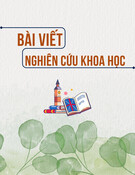


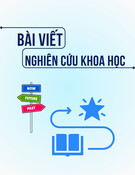
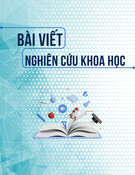
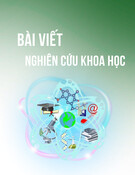
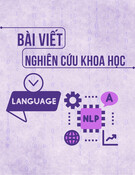


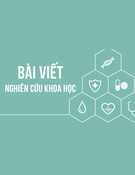



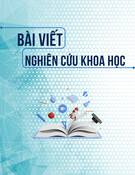

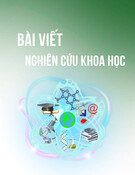

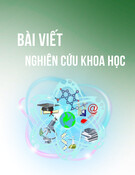


![Định hướng giáo dục STEM trong trường trung học: Tài liệu [chuẩn/mới nhất]](https://cdn.tailieu.vn/images/document/thumbnail/2025/20251124/dbui65015@gmail.com/135x160/25561764038505.jpg)
